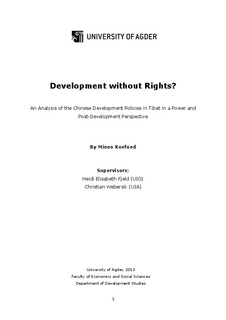| dc.description.abstract | While economic growth keeps reaching new highs in People’s Republic of China (PRC), the inequalities and human rights violations are increasing with a matching speed. Minority areas continue to be characterized by extreme poverty and social unrest, and despite heavy growth rates since the 1990’s, the Tibetan Autonomous Region remains worst off. At the same time the PRC has never invested more resources in development projects in the Tibetan Plateau. Whereas the Chinese Communist Party (CCP) keeps building more high ways, railways and ‘modern housing’ in the name of ‘human development’ in Tibet, more than one hundred individual Tibetans have put their own bodies on fire in what appears to be individual acts of protest against the CCP rule. Development is a normative and political concept, and in many cases imbedded with inexplicit ideological and cultural valuations and assumptions. Through qualitative, in-depth interviews with Tibetan refugees recent arrived from Tibet now living in exile in Dharamsala, India, this thesis indicate that the practical implementation of Chinese development efforts are imbedded with subtle practices of power abuses and limited respect and concern for indigenous knowledge. By imposing controversial conditions on marginalized Tibetan recipients, this research shows that ‘development’ has been actively utilized to further the halting of basic human rights such as freedom of speech and freedom of religion in the region. The PRC thus appears to have failed in winning a high degree of popular support for its development policies in the Tibetan Plateau. This can to certain extent be an explanations why some Tibetans continue to take on the drastic step of engulfing their bodies in flames to protest, and to put themselves in grate risks fleeing illegally to an uncertain state of refugeehood and exile in Nepal and India. The empirical findings of the case of development without human rights in Tibet under the PRC confirm Wolfgang Sachs bold statement from the post-development debate in the early 1990’s: “It did not work”. | no_NO |
